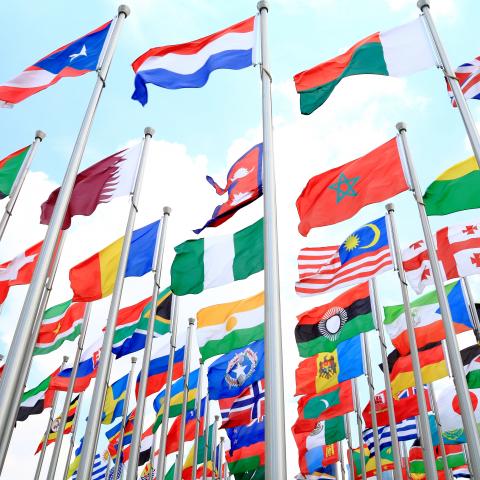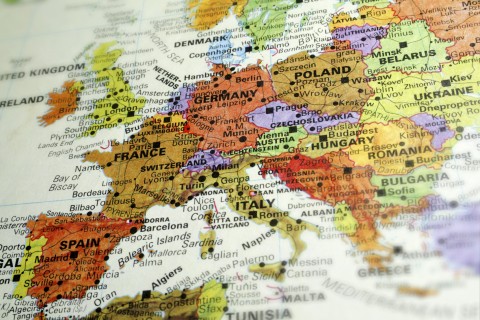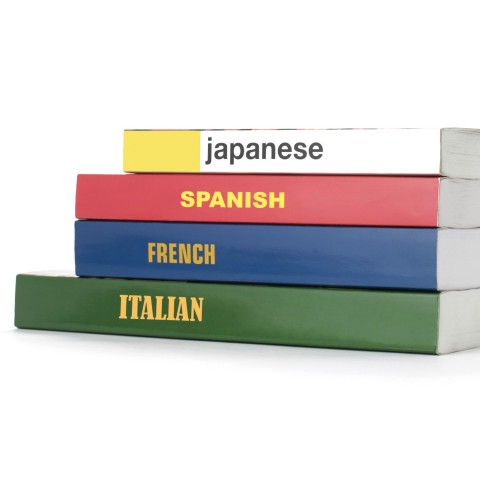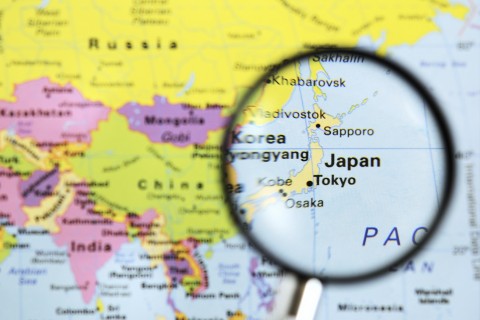
When meeting someone exotic, most of us are interested in where he/she is from and try to start a conversation related to their home country. Likewise, when we’re in a foreign country, we often introduce ourselves by including what country we’re from. Here is the best guide on how to talk about countries and nationalities in Japanese!
As an island nation with a monocultural background, Japanese people are especially conscious and interested in the differences between countries and cultures. Talking about your own country and nationality is a good icebreaker when meeting new people in Japan. Some country names and their major cities are different in Japanese than in English, so it’s useful to know how to say them.
In this article, we’ll introduce how to talk about countries and nationalities in Japanese. This includes:
- The top-ranking nationalities that visit Japan
- Continents and directions
- Questions and answers related to nationality
- Major capital cities of countries
- Languages
- Cuisines
Get ready to make international friends with this guide from JapanesePod101.com!

 Table of Contents
Table of Contents
- Countries & Nationalities
- How to Ask Someone Their Nationality
- How to Tell Someone Your Nationality
- Country, City, Nationality, and Language
- Conclusion
1. Countries & Nationalities
1 – Nouns and Adjectives
As you probably already know, Japanese nouns are very simple to learn compared to those of other languages, such as English and Romance languages. In Japanese, you don’t have to wonder about a noun’s grammatical gender, what article to add, or how to change its form for singular or plural.
Japanese adjectives are also easy to learn because many adjectives simply take the form [noun + の (-no)]. This applies to the names of countries and their corresponding adjectives.
For example:
- ➢ Noun: 国 くに kuni (“country” / “nation”)
- ➢ Adjective: 国の くにの kuni no (“national”)
- ➢ Noun: 日本 にほん Nihon (“Japan”)
- ➢ Adjective: 日本の にほんの Nihon no (“Japanese,” like a Japanese song or a Japanese film)
To express the people of a country, add 人 じん (-jin), meaning person” or “people” after the country name in Japanese.
For example:
- ➢ Country: 日本 にほん Nihon (“Japan”)
- ➢ Nationality: 日本人 にほんじん Nihon-jin (Literally: “Japanese person/people” = “Japanese citizen”)
- ➢ Country: アメリカ あめりか Amerika (“America”)
- ➢ Nationality: アメリカ人 あめりかじん Amerika-jin (Literally: “American person/people” = American citizen)
To learn more about Japanese nouns and Japanese adjectives, please check out our articles Guide to the Top 100+ Japanese Nouns and Learn the Top 100 Essential Japanese Adjectives.
2 – Top 21 Foreign Visitors to Japan
Japan is a fascinating and unique country that attracts global attention and foreign tourists. In 2019, Japan was the third most visited destination in the Asia-Pacific region by international tourist arrivals, following China and Thailand.
Many of the top foreign tourists in Japan are from neighboring Asian countries, according to the JNTO (Japan National Tourism Organization); however, North American and European countries follow close behind.
Let’s take a look at the top 21 countries that visit Japan and learn what they are called in Japanese!
| English | Kanji / Katakana | Hiragana | Reading in Japanese | |
| 1 | China | 中国 | ちゅうごく | Chūgoku |
| 2 | South Korea | 韓国 | かんこく | Kankoku |
| 3 | Taiwan | 台湾 | たいわん | Taiwan |
| 4 | Hong Kong | 香港 | ほんこん | Honkon |
| 5 | United States | アメリカ | あめりか | Amerika |
| 6 | Thailand | タイ | たい | Tai |
| 7 | Australia | オーストラリア | おーすとらりあ | Ōsutoraria |
| 8 | Philippines | フィリピン | ふぃりぴん | Firipin |
| 9 | Malaysia | マレーシア | まれーしあ | Marēshia |
| 10 | Vietnam | ベトナム | べとなむ | Betonamu |
| 11 | Singapore | シンガポール | しんがぽーる | Shingapōru |
| 12 | United Kingdom | イギリス | いぎりす | Igirisu |
| 13 | Indonesia | インドネシア | いんどねしあ | Indoneshia |
| 14 | Canada | カナダ | かなだ | Kanada |
| 15 | France | フランス | ふらんす | Furansu |
| 16 | Germany | ドイツ | どいつ | Doitsu |
| 17 | India | インド | いんど | Indo |
| 18 | Italy | イタリア | いたりあ | Itaria |
| 19 | Spain | スペイン | すぺいん | Supein |
| 20 | Macau | マカオ | まかお | Makao |
| 21 | Russia | ロシア | ろしあ | Roshia |

3 – Continents, Regions, and Directions in Japanese
| English | Kanji / Katakana | Hiragana | Reading |
| Africa | アフリカ | あふりか | Afurika |
| America | アメリカ | あめりか | Amerika |
| Asia | アジア | あじあ | Ajia |
| Europe | 欧州 / ヨーロッパ | おうしゅう /よーろっぱ | Ōshū / Yōroppa |
| Middle East | 中東 | ちゅうとう | Chūtō |
| Oceania | オセアニア | おせあにあ | Oseania |
As with country names, you can change the names of continents/regions to adjectives by adding の (-no).
For example:
- ➢ Noun: アフリカ あふりか Afurika (“Africa”)
- ➢ Adjective: アフリカの あふりかの Afurika no (“African”)
- ➢ Noun: 中東 ちゅうとう Chūtō (“Middle East”)
- ➢ Adjective: 中東の ちゅうとうの Chūtō no (“Middle Eastern”)
In order to be more specific, add the following directions in front of the country or region name:
| English | Kanji | Hiragana | Reading |
| East | 東 | ひがし / とう | Higashi / Tō |
| West | 西 | にし / さい | Nishi / Sai |
| South | 南 | みなみ / なん | Minami / Nan |
| North | 北 | きた / ほく | Kita / Hoku |
For example:
- ➢ Southeast Asia: 東南アジア とうなんあじあ Tōnan Ajia
- ➢ West Africa: 西アフリカ にしあふりか Nishi Afurika
- ➢ South America: 南米 なんべい Nanbei*
- ➢ North Europe: 北欧 ほくおう Hokuō**
*“America” is also phrased as 米国 べいこく (beikoku), and “North America” and “South America” are expressed as 北米 ほくべい (Hokubei) and 南米 なんべい (Nanbei) respectively.
** “Europe” in Japanese is 欧州 おうしゅう (ōshū) where the Kanji 欧 represents “Europe” and 州 is “States.”
When specifying the region in Europe, 欧 is used together with the direction Kanji: “South Europe” = 南欧 なんおう (Nan’ō) and “East Europe” = 東欧 とうおう (Tōō).
To learn more about directions in Japanese, check out Giving and Asking for Directions: “Right” in Japanese & More.

2. How to Ask Someone Their Nationality
When meeting new people, especially those who are exotic, the very first question you’re likely to hear or ask is “Where are you from?” Asking about who they are is a good icebreaker if you want to get to know them better.
In Japanese, 敬語 (keigo), or “honorific speech,” is normally used when you’re talking to someone for the first time, unless they are a friend of your close friend and is around your age (or younger).
Here are some question phrases for asking someone their nationality:
- Where are you from?
(あなたの) 出身はどこですか。 (Anata no) shusshin wa doko desu ka.
You can omit あなたの (anata no), or “your” because it’s obvious that you’re talking to this person. This phrase can also be used to ask someone where they are from domestically.
- What is your nationality?
(あなたの)国籍は何ですか。 (Anata no) kokuseki wa nan desu ka.
This question sounds a bit too direct for casual conversation. This might be asked in some official procedure, for instance.
The answer to this question can be :
“My nationality is Japanese.” 私の国籍は日本です。Watashi no kokuseki wa nihon desu. or
“I have Japanese nationality / Japanese citizenship.” 日本の国籍 / 市民権 を持っています。Nihon no kokuseki / shiminken wo motte imasu.
- What country are you from? (Literally: A person from what country? )
どこの国の方ですか。 Doko no kuni no kata desu ka.
This is a more polite way to ask someone their nationality.
- What country are you from?
どこの国から来ましたか。 Doko no kuni kara kimashita ka.
This is another common way to ask where they are from.
- Are you [nationality]?
[Nationality] 人ですか。 [Nationality] -jin desu ka.
This phrase sounds a bit too direct, but this can be used when you hear a particular language someone is speaking and you assume this person is from that country, etc.
For example, when you hear someone speaking Thai, you could ask them:
“Are you Thai?”
タイ人ですか。Tai-jin desu ka.
- Are you from Japan?
[Country] 出身ですか。 [Country] shusshin desu ka.
This phrase is also used domestically. For example, you could ask this when you hear a particular dialect and ask the person if they’re from that particular region.
- Where were you born?
生まれはどこですか。 Umare wa doko desu ka.
For more useful Japanese questions, please take a look at our article The 10 Most Useful Japanese Questions and Answers.

3. How to Tell Someone Your Nationality
Not only answering the question you were asked, but also giving extra information about yourself is a good way to keep a nice conversation going.
Here are some response phrases to talk about your nationality and more.
- I’m from Japan.
私は Japan 出身です。 Watashi wa Japan shusshin desu.
私は (Watashi wa), meaning “I am,” can be omitted when it’s obvious that you’re talking about yourself.
Example:
- ➢ Where are you from?
出身はどこですか。 Shusshin wa doko desu ka.
- ➢ I’m from Brazil.
ブラジル出身です。 Burajiru shusshin desu.
- I come from Japan.
私は Japanから来ました。 Watashi wa Japan kara kimashita.
Example:
- ➢ What country are you from?
どこの国から来ましたか。 Doko no kuni kara kimashita ka.
- ➢ I come from Russia.
私はロシアから来ました。 Watashi wa Roshia kara kimashita.
- I am [nationality].
私は [nationality] 人です。Watashi wa [nationality] -jin desu.
Example:
- ➢ What country are you from? (Literally: A person from what country? )
私は [nationality] 人です。Watashi wa [nationality] -jin desu.
どこの国の方ですか。 Doko no kuni no kata desu ka.
- ➢ I am Kenyan.
私はケニア人です。 Watashi wa Kenia-jin desu.
- I am [nationality] but I live in Japan.
私は[nationality] 人ですが、Japan に住んでいます。
Watashi wa [nationality] –jin desu ga, Japan ni sunde imasu.
Example:
- ➢ What country are you from?
どこの国から来ましたか。 Doko no kuni kara kimashita ka.
- ➢ I am Chinese, but I live in Singapore.
私は中国人ですが、シンガポールに住んでいます。
Watashi wa Chūgoku-jin desu ga, Shingapōru ni sunde imasu.
In some cases, a country of citizenship may not match with where you were born/grew up and currently live, or even your ethnicity. Such as when someone is a permanent resident in a country while having a foreign citizenship, or someone born in one country with a mother and a father from other countries. In such cases, suggestedyou can use following phrases;
- I was born in [country 1] and grew up in [country 2].
私は[country 1]生まれで、[country 2]で育ちました。
Watashi wa [country 1] umare de, [country 2] de sodachimashita.
Example:
- ➢ Where were you born?
生まれはどこですか。Umare wa doko desu ka.
- ➢ I was born in America and grew up in Argentina.
私はアメリカ生まれで、アルゼンチンで育ちました。
Watashi wa Amerika umare de, Aruzenchin de sodachimashita.
- I am [nationality 1] and [nationality 2].
私は[nationality 1] 人で、[nationality 2]人です。
Watashi wa [nationality 1] -jin de, [nationality 2] -jin desu.
Example:
- ➢ Are you Spanish?
スペイン人ですか。 Supein-jin desu ka.
- ➢ I am Italian and Canadian.
私はイタリア人で、カナダ人です。
Watashi wa Itaria-jin de, Kanada-jin desu.
- My father is [nationality 1] and my mother is [nationality 2].
私の父は[nationality 1] 人で、私の母は[nationality 2]人です。
Watashi no chichi wa [nationality 1] -jin de, watashi no haha wa [nationality 2] -jin desu.
Example:
- ➢ Are you British?
イギリス人ですか。 Igirisu-jin desu ka.
- ➢ My father is Dutch and my mother is South African.
私の父はオランダ人で、私の母は南アフリカ人です。
Watashi no chichi wa Oranda-jin de, watashi no haha wa Minami Afurika-jin desu.
To learn more about how to introduce yourself, please check out How to Say “My Name is,” in Japanese + More!

4. Country, City, Nationality, and Language
1 – Variations of Country and Nationality: Language, Cuisines, etc.
Like people from a certain country being expressed by adding 人 じん (-jin) after the country name, Japanese can express other things by simply adding a word.
Language
[Country name] + 語 (-go) “language” = Language
For example:
Japanese: 日本語 Nihon-go
French: フランス語 Furansu-go
German: ドイツ語 Doitsu-go
Spanish: スペイン語 Supein-go
Korean: 韓国語 Kankoku-go
Chinese: 中国語 Chūgoku-go
Vietnamese: ベトナム語 Betonamu-go
Russian: ロシア語 Roshia-go
“English” is 英語 (Eigo), expressed with the Kanji 英 (ei), which indicates “United Kingdom.”

Cuisines
[Country name] + 料理 (ryōri) “cooked food” = a country’s cuisine
For example:
Japanese: 日本料理 Nihon ryōri
French: フランス料理 Furansu ryōri
German: ドイツ料理 Doitsu ryōri
Spanish: スペイン料理 Supein ryōri
Korean: 韓国料理 Kankoku ryōri
Chinese: 中国料理 Chūgoku ryōri
Vietnamese: ベトナム料理 Betonamu ryōri
Russian: ロシア料理 Roshia ryōri
Counter Word for Country
There are particular counter words in Japanese when counting things, actions, and events. To count countries, add カ国 (-kakoku) after the number.
For example:
1カ国 ikkakoku (1 country)
2カ国 ni-kakoku (2 countries)
5カ国 go-kakoku (5 countries)
10カ国 jukkakoku (10 countries)
2 – Capital Cities, Nationalities, Languages, and Cuisines
Let’s take a look at major countries and how their major cities, nationalities, languages, and cuisines are said in Japanese:
| English | Country | Major City | Nationality | Language | Cuisines |
| China | 中国 chūgoku | 北京 Pekin 上海 Shanhai | 中国人 Chūgoku-jin | 中国語 Chūgoku-go | 中国料理Chūgoku ryōri |
| Korea | 韓国 Kankoku | ソウル Sōru | 韓国人 Kankoku-jin | 韓国語 Kankoku-go | 韓国料理Kankoku ryōri |
| Taiwan | 台湾 Taiwan | 台北 Taipei | 台湾人 Taiwan-jin | 台湾語 Taiwan-go | 台湾料理 Taiwan ryōri |
| Thailand | タイ Tai | バンコク Bankoku | タイ人 Tai-jin | タイ語 Tai-go | タイ料理 Tai ryōri |
| India | インド Indo | デリー Derī ムンバイ Munbai | インド人 Indo-jin | ヒンドゥー語Hindū-go | インド料理 Indo ryōri |
| Australia | オーストラリアŌsutoraria | シドニー Shidonī メルボルンMeruborun | オーストラリア人Ōsutoraria-jin | 英語 Eigo | オーストラリア料理 Ōsutoraria ryōri |
| New ZealanNyū jīrandod | ニュージーランド Nyū jīrando | オークランドŌkurando | ニュージーランド人 Nyū jīrando-jin | 英語 Eigo | ニュージーランド料理 Nyū jīrando ryōri |
| United States | アメリカ Amerika | ニューヨーク Nyū yōku ロスアンジェルス Rosu anjerusu | アメリカ人Amerika-jin | 英語 Eigo | アメリカ料理 Amerika ryōri |
| Canada | カナダ Kanada | バンクーバーBankūbā | カナダ人Kanada-jin | 英語 Eigo | カナダ料理Kanada ryōri |
| Mexico | メキシコMekishiko | メキシコシティMekishiko shitī | メキシコ人Mekishiko-jin | スペイン語Supein-go | メキシコ料理 Mekishiko ryōri |
| Brazil | ブラジル Burajiru | サンパウロ San pauro リオデジャネイロ Rio de janeiro | ブラジル人Burajiru-jin | ポルトガル語Porutogaru-go | ブラジル料理 Burajiru ryōri |
| Argentina | アルゼンチン Aruzenchin | ブエノスアイレス Buenosu airesu | アルゼンチン人 Aruzenchin-jin | スペイン語 Supein-go | アルゼンチン料理 Aruzenchin ryōri |
| Russia | ロシア Roshia | モスクワMosukuwa | ロシア人 Roshia-jin | ロシア語 Roshia-go | ロシア料理 Roshia–ryōri |
| France | フランス Furansu | パリ Pari | フランス人 Furansu-jin | フランス語 Furansu-go | フランス料理 Furansu ryōri |
| Germany | ドイツ Doitsu | ベルリン Berurin | ドイツ人 Doitsu-jin | ドイツ語 Doitsu-go | ドイツ料理 Doitsu ryōri |
| Italy | イタリア Itaria | ローマ Rōma | イタリア人 Itaria-jin | イタリア語 Itaria-go | イタリア料理 Itaria ryōri |
| Spain | スペイン Supein | マドリード Madorīdo | スペイン人 Supein-jin | スペイン語 Supein-go | スペイン料理 Supein ryōri |
| United Kingdom | イギリス Igirisu | ロンドン Rondon | イギリス人 Igirisu-jin | 英語 Eigo | イギリス料理 Igirisu ryōri |
| Netherlands | オランダ Oranda | アムステルダム Amusuterudamu | オランダ人 Oranda-jin | オランダ語 Oranda-go | オランダ料理 Oranda ryōri |
| Turkey | トルコ Toruko | イスタンブール Isutanbūru | トルコ人 Toruko–jin | トルコ語 Toruko-go | トルコ料理 Toruko ryōri |
| Egypt | エジプト Ejiputo | カイロ Kairo | エジプト人 Ejiputo-jin | アラビア語 Arabia-go | エジプト料理 Ejiputo ryōri |
| Kenya | ケニア Kenia | ナイロビ Nairobi | ケニア人 Kenia-jin | スワヒリ語 Suwahiri-go | ケニア料理 Kenia ryōri |
3 – Example Sentences
- I am Japanese, but I grew up in Germany. I like Brazilian cuisine.
私は日本人ですが、ドイツで育ちました。ブラジル料理が好きです。
Watashi wa Nihon-jin desu ga, Doitsu de sodachimashita. Burajiru ryōri ga suki desu.
- I’m from Canada, and I speak English and French.
私はカナダ出身で、英語とフランス語を話します。
Watashi wa Kanada shusshin de, Eigo to Furansu-go o hanashimasu.
- I’m Indian, but I was born in Turkey. I can speak Turkish.
私はインド人ですが、トルコで生まれました。私はトルコ語が話せます。
Watashi wa Indo-jin desu ga, Toruko de umaremashita. Watashi wa Toruko-go ga hanasemasu.
- She is American and she loves Italy and Italian cuisine. She is learning Italian.
彼女はアメリカ人で、イタリアとイタリア料理が大好きです。彼女はイタリア語を学んでいます。
Kanojo wa Amerika-jin de, Itaria to Itaria ryōri ga daisuki desu. Kanojo wa Itaria-go o manande imasu.
- His father is Chinese and his mother is Russian, but he usually speaks English.
彼のお父さんは中国人で、彼のお母さんはロシア人ですが、彼は普段英語を話します。
Kare no o-tō-san wa Chūgoku-jin de, kare no o-kā-san wa Roshia-jin desu ga, kare wa fudan Eigo o hanashimasu.
- I am British and I often go to Asia for work. I’m learning Thai and Chinese.
私はイギリス人で、仕事でよくアジアへ行きます。タイ語と中国語を学んでいます。
Watashi wa Igirisu-jin de, shigoto de yoku Ajia e ikimasu. Tai-go to Chūgoku-go o manande imasu.
- I am from Australia, but I grew up in South America and the Middle East. I can speak Spanish and Arabic.
私はオーストラリア人ですが、南米と中東で育ちました。スペイン語とアラビア語が話せます。
Watashi wa Ōsutoraria-jin desu ga, Nanbei to Chūtō de sodachimashita. Supein-go to Arabia-go ga hanasemasu.

5. Conclusion
In this article, we introduced how to talk about countries and nationalities in Japanese. We covered everything from the top-ranking nationalities visiting Japan, continents and directions, Q&A conversational phrases, major cities, languages, and cuisines. With this guide, you’re now ready to introduce yourself in Japanese and also talk about countries to make international friends!
If you would like to learn more about the Japanese language and pick up other useful Japanese phrases for specific situations, you’ll find a lot more helpful content on JapanesePod101.com. We provide a variety of free lessons for you to help improve your Japanese language skills.
The following articles are also very useful for boosting your Japanese conversational skills:
- Learn the Most Useful Compliments in Japanese
- Life Event Messages: Happy Birthday in Japanese & More
- Useful Intermediate Japanese Phrases
And there’s so much more! Be a faster learner and enjoy studying Japanese at JapanesePod101.com!
Before you go, let us know in the comments if there are Japanese words on any specific topic that you want to know! We’d be glad to help, and look forward to hearing from you!










